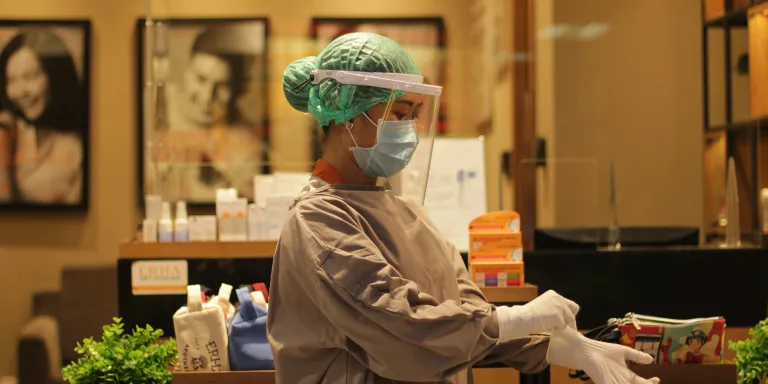
Keyworkers have been the nation’s heroes throughout the Covid-19 pandemic, continuing to carry out essential duties and save lives despite the physical health risks and toll on mental health.
Relate and the University of Worcester’s Families Un-locked study has highlighted how the impact on family life and relationships has also been considerable for many working on the frontline.
Families Un-locked study
We launched Families Un-locked in August 2020 to look specifically at the impact of the pandemic on relationships and family life. Initial findings from data collected during the first UK lockdown pointed towards the lasting impact of pandemic on families.
During the first phase of the study we heard from almost 800 people and about a third of these were key workers working in health and emergency services, social care, including care for elderly people, police and fire rescue, education and childcare as well as transport, food processing and essential provision.
Just over a quarter of the keyworkers (26%) worked in frontline care. The vast majority of keyworkers were in a couple relationships (85%), and just under half (44%) had a partner working as keyworker, in ‘dual-keyworker’ couples.
The pandemic and keyworkers’ relationships
The keyworkers who took part in the study were more likely to say they had been arguing more since the pandemic (40% of couples where one partner is a keyworker compared to 35% of non-keyworker couples). This actually rose to 45% for couples where both partners were keyworkers.
Also, more dual-keyworker couples said they’d been growing apart (43% ) and had felt tension/strain in their relationship (68%). To add to this almost half (45%) felt less positive about their relationship and less close than the one-keyworker and non-keyworker couples.
Several keyworkers also referred to the impact of frontline work stress spilling into their couple relationships.
One respondent commented: “My husband’s job being very stressful and us not getting on and not supporting each other” (NHS dual-keyworker couple).
Others lived apart from family members to keep them safe which put pressure on relationships at home: “Missing my husband who was [isolating] in a hotel for 8 weeks” (partner of NHS keyworker).
The pandemic and keyworkers’ families
The qualitative data reveal the extent of lockdown on keyworkers’ family life. Many keyworkers reported being worried about passing the virus to their families. It was also difficult to witness their families worrying for them: “Seeing [my] elderly parent worry for my health” (social care keyworker).
Keyworker parents vividly described the difficult choices that they had to make, with some making comments about not feeling like a good enough parent, not being able to give their children enough attention while at the same time struggling to do their job.
At times they felt compelled to ‘hide’ their own stress and to be there for their children. It is worth noting that the children of many keyworkers were able to attend school during lockdown unlike most other children. This is possibly why more non-keyworker families reported feeling overwhelmed by their childcare responsibilities (78%) and felt anxious about their children’s education (85%).
While home-schooling was often referred to as a struggle by parents generally, some keyworker parents referred to it as “we did not have the luxury of home-schooling.”
For dual keyworkers, it appears to have been particularly tough, they spoke about the compound effect of the strains they felt due to the demands of their work while protecting themselves and their families, children and friends.
These competing tensions were vividly described specifically by NHS keyworkers in our study :
- “Not feeling supported/understood by my partner when having to isolate for two weeks with the children.
- "Not feeing able to carry out my job…Not seeing family members or support friends in person."
- “Trying to filter what the children are exposed to re the virus while continuing to send them to nursery."
- "Allowing others (friends/family/colleagues) to express their anxieties to me without being consumed by them or disregarding them."
- "Seeing other people lose loved ones”.
Support for NHS workers
Struggling to balance work and family life has also been a key issue that has been reported on RelatehubNHS – Relate’s free WebChat service which offers FREE 30 minute WebChats with Relationships and Wellbeing Advisors to NHS staff members in specific trusts.
Despite all of these pressures on relationships and family life, keyworkers referred to their jobs as a source of strength and as ‘doing one’s duty’ as part of the national effort.
We are so grateful to everything keyworkers are doing to get us through the pandemic and would urge anyone experiencing difficult issues to seek support.
How we can help
If you’re looking for support with your relationships, we can help. We offer a range of ways to speak with a trained relationship expert including ongoing counselling, 30 minute web and phone chats, and one session therapy.
Find out which service is right for you
How you can help
Have you found this advice helpful? Make a donation to help us reach more people and continue supporting the nation’s relationships:
Can't afford to donate? We understand. Instead, we ask that you leave us a 5 star review on Trustpilot.